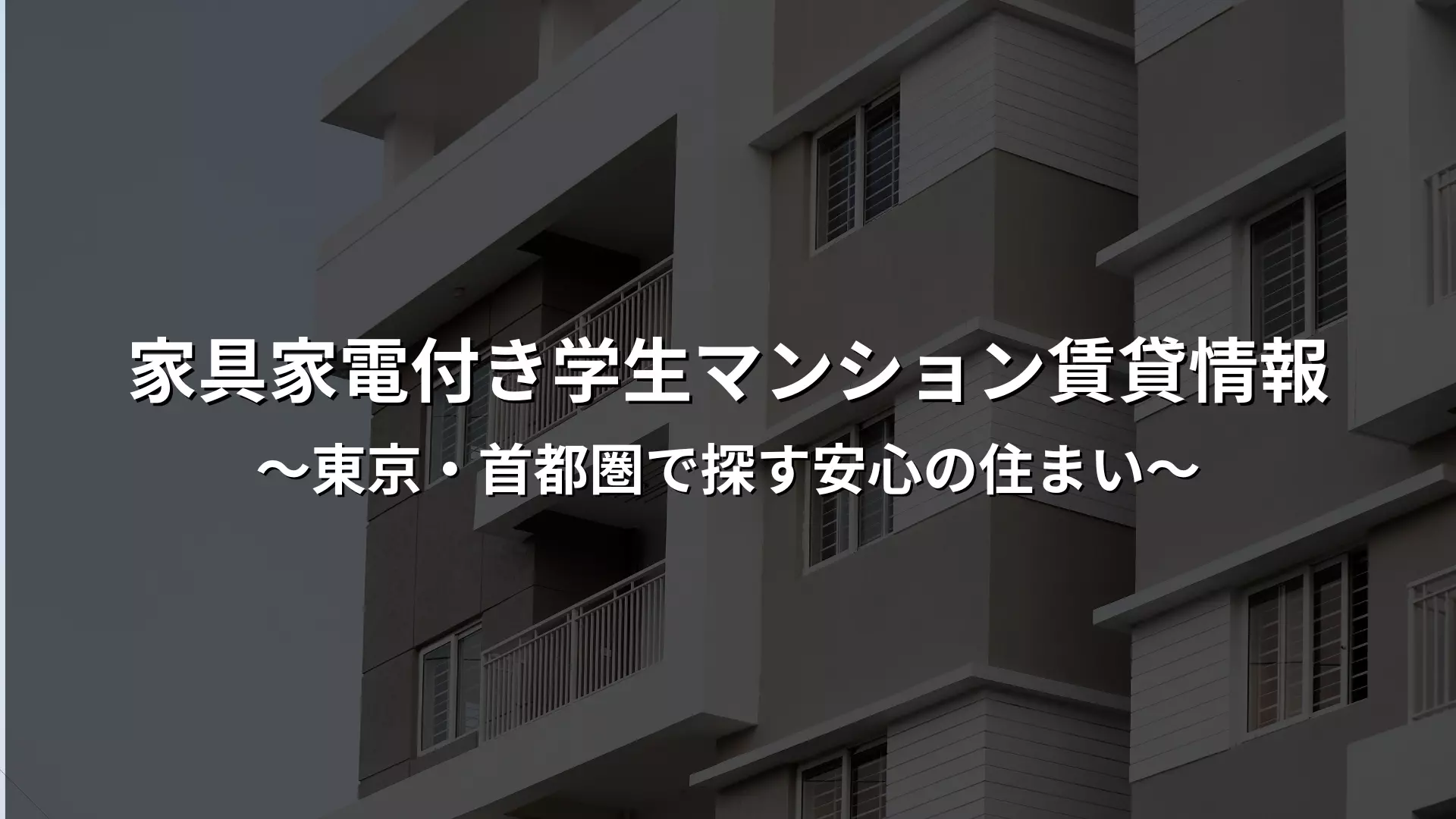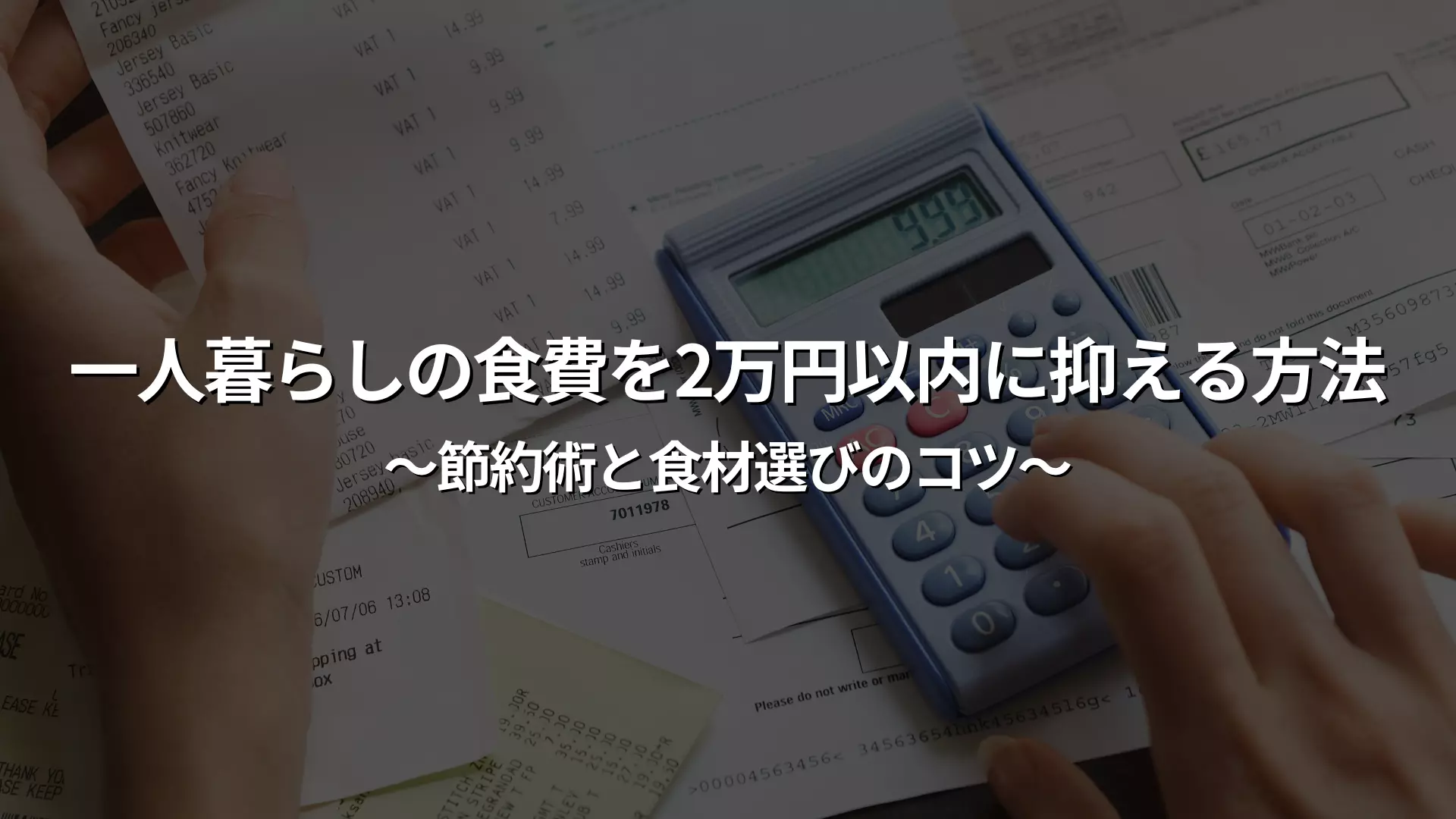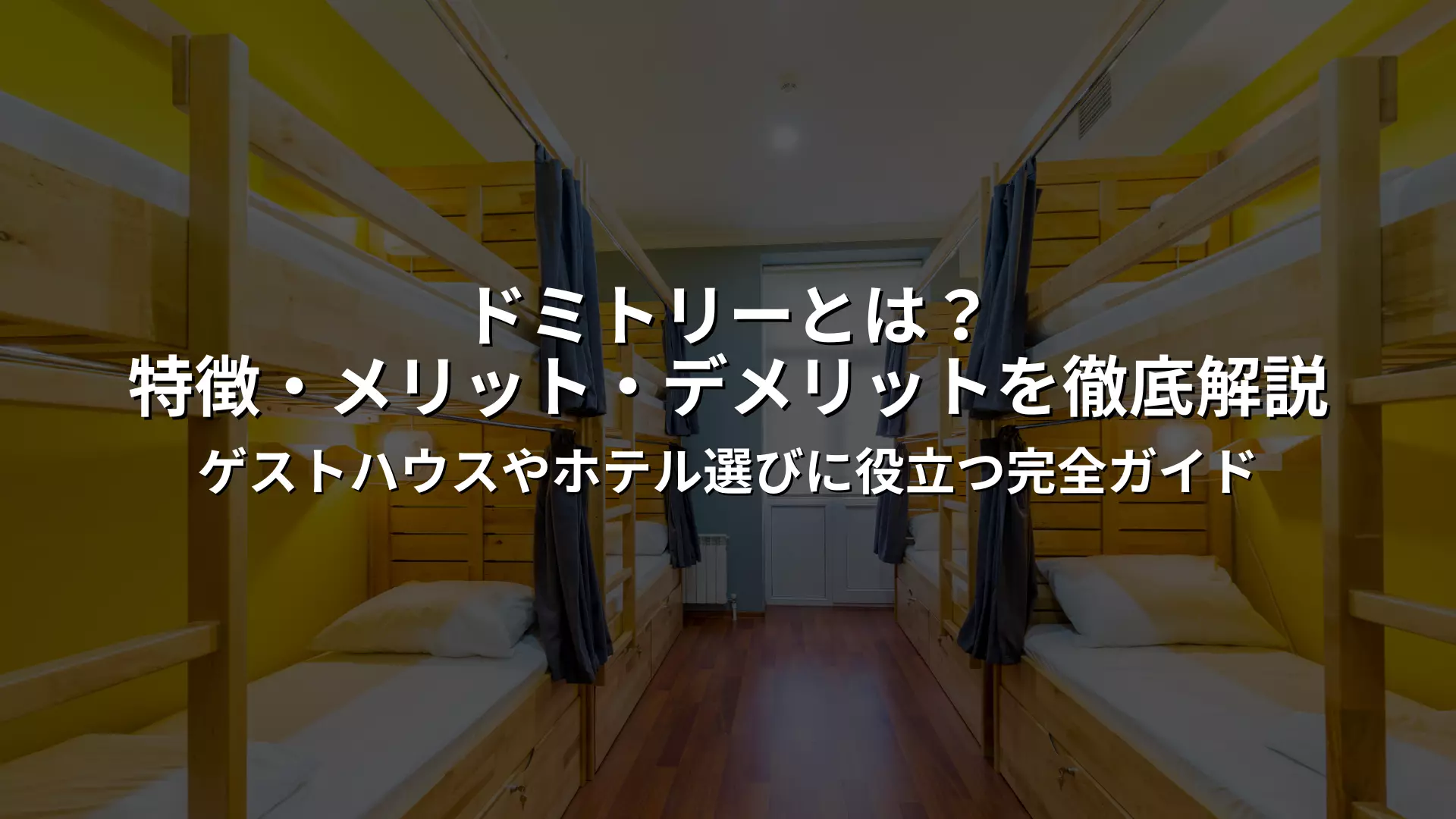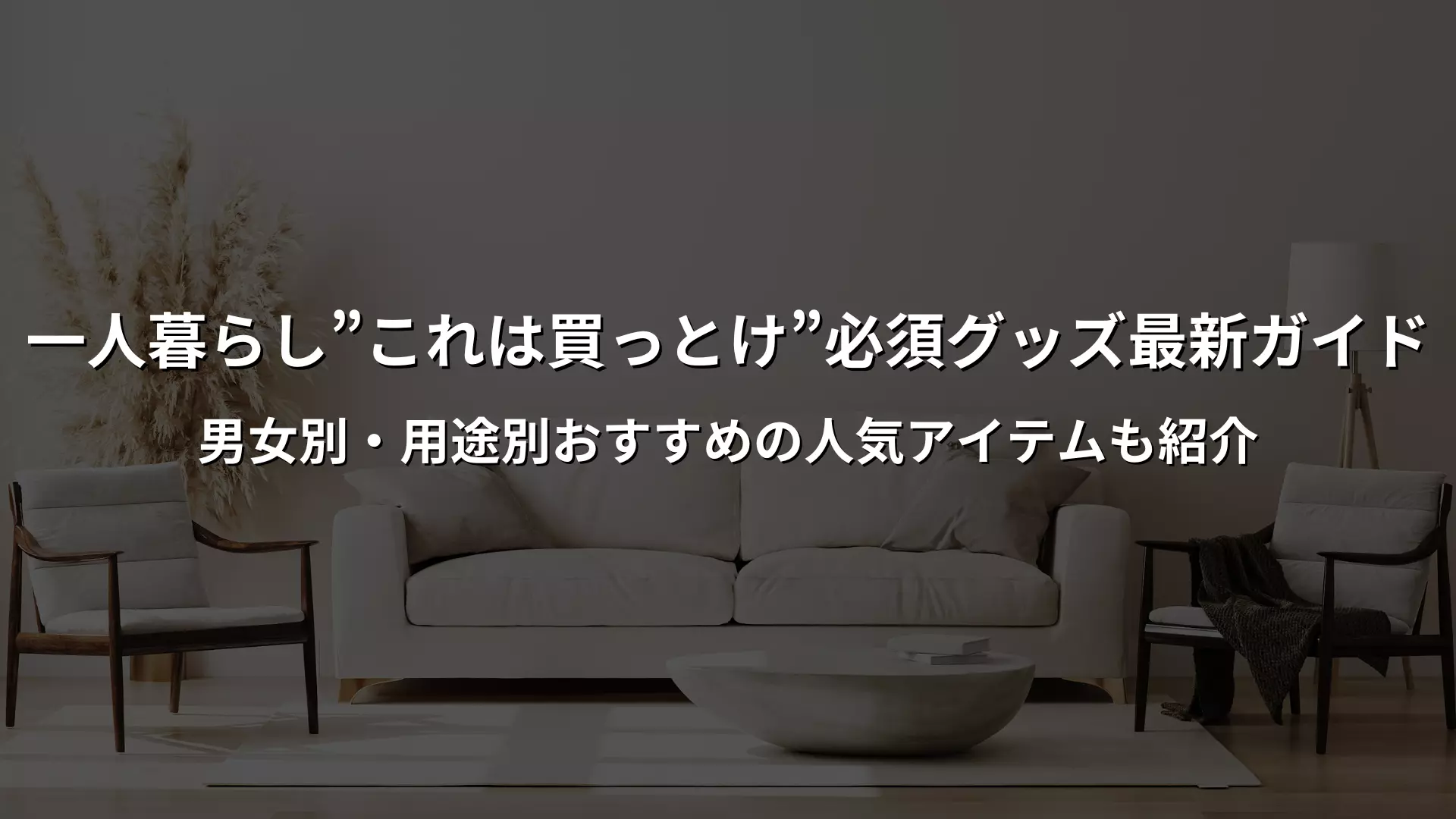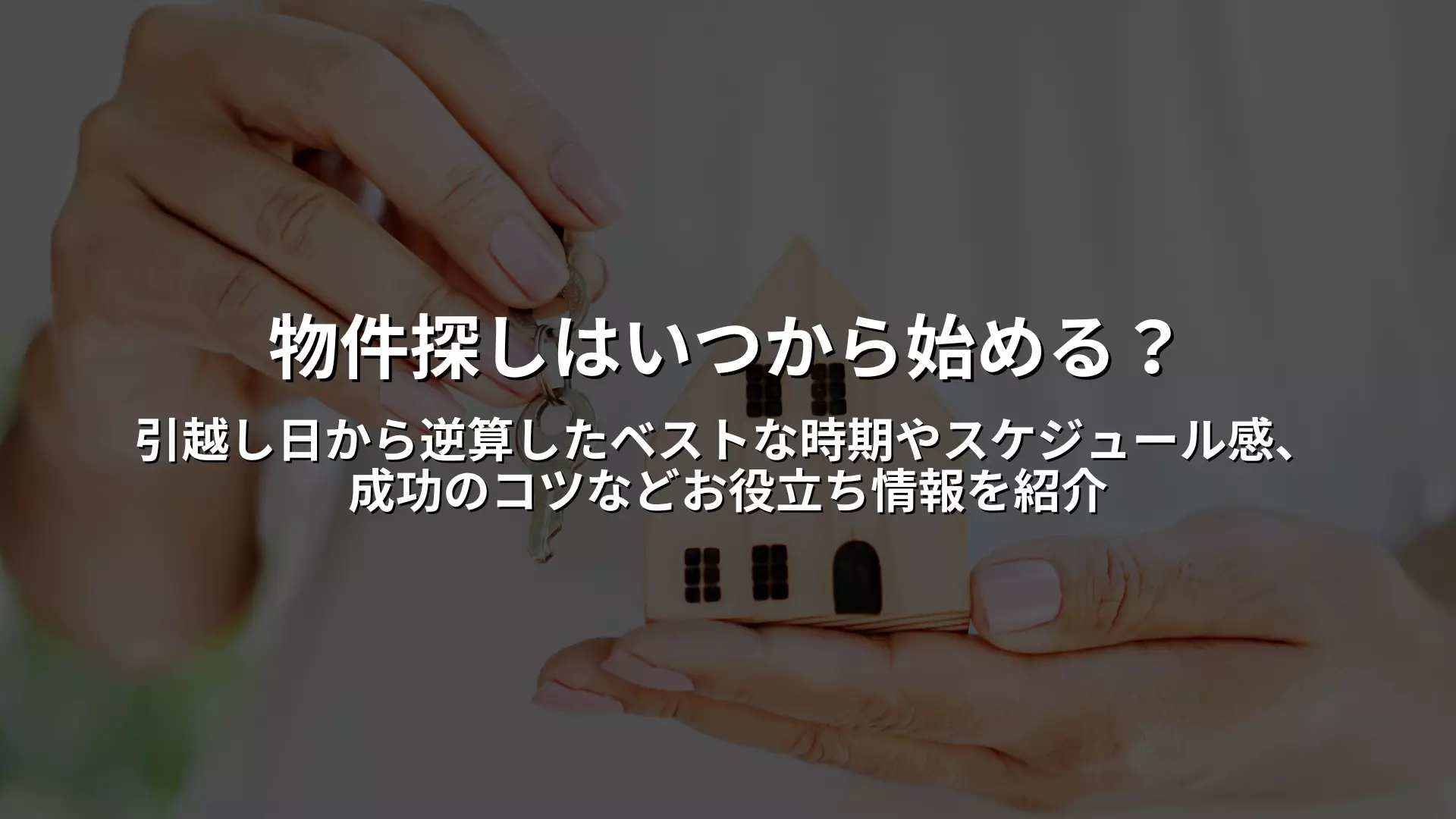What are the utility costs for living alone?
When you start living alone, utility costs are something you'll be concerned about along with rent and food costs. Monthly costs for electricity, gas, and water vary greatly depending on your lifestyle, but knowing the general guidelines can help you manage your household finances and choose a property.
First, we will explain what specific expenditures "utility bills" refer to, and what the average utility bills are for a single-person household.
What is included in utility bills?
"Utility costs" refers to the following three costs, which are infrastructure necessary for daily life.
- Electricity bill: Costs for using lighting, home appliances, air conditioning, etc.
- Gas bill: Costs mainly used for cooking and hot water (city gas or propane gas)
- Water bill: Expenses necessary for daily life such as drinking water, washing, toilets, and baths
These charges are billed monthly or every two months depending on your area and contract details. If you live alone, the charges can vary greatly depending on how you use your electricity, so it's important to know the approximate charges.
Average amount for single-person households (based on statistics from the Ministry of Internal Affairs and Communications + latest trends)
According to the Ministry of Internal Affairs and Communications' "Household Survey (Single-Person Households)," the average monthly utility bills as of 2024 will be as follows (national average for single people in their 20s to 40s).
- Electricity bill: 5,500 yen
- Gas fee: 3,000 yen (if using city gas)
- Water bill: 2,000 yen (approximately 4,000 yen for two months)
- Total: Approximately 10,500 to 12,000 yen
However, this is only an average, and it will fluctuate depending on the region, season, and lifestyle. In particular, in summer and winter when air conditioning is used frequently, or in areas where propane gas is used, it is not uncommon for gas bills to be nearly double the average.
Average electricity bills and tips for saving money
Electricity bills make up a large portion of the utility bills for those living alone, and are an expense that directly impacts the household budget. Monthly bill amounts can vary depending on daily usage, especially for frequently used appliances such as air conditioners, refrigerators, and microwaves.
In this chapter, we will explain the average electricity bill and how to save money.
Average monthly electricity bill for a single person and annual fluctuations
According to the Ministry of Internal Affairs and Communications' household survey, the average monthly electricity bill for a single-person household is approximately 5,000 to 6,000 yen. However, this is the yearly average, and the actual amount can vary greatly depending on the season.
For example, in the summer, when air conditioning is used frequently, the cost will increase to around 6,000 to 8,000 yen, while in the winter, when heaters and electric blankets are used, the cost may also rise to around 6,500 to 9,000 yen.On the other hand, in seasons when heating and cooling are hardly used, such as spring and autumn, the cost is often kept to around 3,500 to 5,000 yen.
As electricity bills are greatly affected by lifestyle and climate, it is important to be conscious of controlling your usage within reasonable limits.
Relationship between contracted amperage and savings
Depending on the terms of your contract with your power company, your monthly basic fee may be excessive. One thing you should especially review is your "contracted amperage." The higher the amperage, the more electricity you can use at one time, but your basic fee will also increase.
If you live alone, 20 to 30 amps is often sufficient, and anything over 40 amps may be excessive. If you haven't reviewed your contract since it was signed, you may be able to reduce your monthly fixed costs by comparing it with your electricity usage and changing it to the minimum amperage necessary.
If your breaker trips frequently, it's a sign that you don't have enough amperage, but if you're able to live without any problems, it's worth lowering it.
Precautions when using air conditioners in summer and winter
Heating and cooling consume a particularly large amount of electricity, so you can expect to see significant savings just by being careful about how you use it. The following tips are effective.
- Set the air conditioner to 28 degrees and the heater to 20 degrees.
- Use a fan or air circulator to circulate the air
- Close the curtains to reduce the effect of the outside temperature
- Determine whether turning off the air conditioner when you go out or whether it's cheaper to leave it on
- Clean your air conditioner filters regularly
In addition, old air conditioners are less energy efficient and tend to waste electricity when used for long periods of time. Even if it is difficult to replace your air conditioner right away, you can save several hundred to a thousand yen per month by being conscious of the temperature settings and usage time.
Search from 6,630 rooms of 990 properties
Average gas prices and pricing structures
Gas is an essential part of daily life, used for cooking, hot water, heating, and more. For those living alone, monthly bills vary greatly depending on how often you use the gas, but you should pay particular attention to the type of gas. City gas and propane gas have different pricing structures, and the amount you pay can vary greatly even if you use the gas the same way.
Differences and effects between city gas and propane gas
There are two main types of gas used in Japan.
- City gas: Supplied through underground pipes in urban areas. Prices are stable and the unit price is low.
- Propane gas (LP gas): Gas cylinders are delivered to each household for use. Both the basic fee and unit price are high, and there are large regional differences.
Many apartments for single people and properties in the suburbs use propane gas, which can be more than twice as expensive as city gas. Even if you use the same amount per month, what would cost 3,000 yen for city gas could cost 5,000 to 6,000 yen for propane.
When choosing a property, be sure to check whether the type of gas is listed.
Reasons for high gas bills and how to improve them
The main reasons for high gas bills are as follows:
- Propane gas contract
- Frequently using hot water (reheating water or taking long baths)
- I use gas heating in the winter
- The water temperature is set too high
The following points are useful for review:
- Shorten your shower time
- Reduce the number of reheating cycles
- Check your gas company bill and if the unit price is high, consult with the management company.
- Set the temperature of your gas water heater slightly lower (around 42°C).
In the case of propane gas, the unit price may be reduced through negotiation depending on the contract. One way to do this is to inquire through your landlord or real estate company.
Costs vary depending on how you use the bath
If you live alone, your monthly gas bill will vary depending on whether you take a bath or just a shower.
- Filling the bathtub: Approximately 150 liters of hot water is used per filling, so the gas cost per filling is approximately 100 to 150 yen.
- Shower only: If you only take about 10 minutes, it will cost about 30 to 50 yen per shower.
Lifestyles such as "having the habit of soaking in the bathtub every day" and "taking long showers" can increase your gas bill. You can make reasonable savings by taking showers only in the summer or lowering the water temperature a little.
Average water bill and water-saving tips
Water bills are said to be a relatively small amount among utility bills, but they can make a surprising difference depending on how you use your appliances on a daily basis. In particular, if you shower or use the washing machine frequently, your bill may increase more than you expected.
In this chapter, we will explain the average water bill for a single person and some easy-to-implement water-saving tips.
Estimated monthly fee and billing schedule
The national average monthly water bill for a single person is about 2,000 yen. However, in many municipalities, water bills are billed every two months, and the amount per bill can be around 4,000 yen.
This amount includes the basic water and sewerage charges, as well as a metered charge based on the amount of water used. Many areas use a "tiered rate" system, where the more you use, the higher the price becomes, so you need to be careful not to use too much water.
Rates vary by region, with some municipalities, like Tokyo, having relatively low water rates, while others, like regional cities, have slightly higher rates. When choosing a place to move to, it's a good idea to check the water rate guidelines.
How to save water in the toilet, shower, and laundry
Even if you live alone, small everyday efforts can be effective in reducing your water bill. The following points are particularly easy to keep in mind and incorporate into your daily routine.
【toilet】
- Choose a property that has a water-saving toilet
- Simply switching the lever from "large" to "small" will cut your water usage in half.
【shower】
- Leaving the shower running for 10 minutes uses about 100 liters of water, so reducing the shower time by just 5 minutes can significantly reduce water consumption.
- Make it a habit to frequently turn off the water while brushing your teeth or shampooing
【laundry】
- Washing laundry together reduces water usage
- Use "quick mode" and "water saving mode"
- If possible, use a drum-type washing machine, which uses less water than a top-loading type.
Another option is to replace your old faucets and shower heads with water-saving models. An investment of just a few thousand yen can save you thousands more per year.
Search from 6,630 rooms of 990 properties
How much difference does it make depending on season, region, and gender?
It's difficult to get a true picture of utility bills for a single person just by looking at the average amount. In reality, monthly expenditures vary greatly depending on the season, region, gender, and lifestyle. In this chapter, we'll explain how utility bills fluctuate based on the main factors.
Differences in utility bills between summer and winter
Seasonal fluctuations are one of the biggest factors in overall energy costs, especially in summer and winter, when people use heating and cooling more frequently, leading to higher electricity and gas bills.
[Summer trends]
- Air conditioning increases electricity bills
- Costs can be reduced by using measures to block outside air temperature while air conditioning is running (circulators, heat-blocking curtains, etc.).
- People often only take a shower, so gas bills are relatively low.
[Winter trends]
- Electricity and gas bills have risen due to the use of heating equipment
- As people spend more time in the bathtub, gas bills can be nearly double what they would be in the summer.
- The use of dehumidifiers and dryers to dry laundry indoors also has an impact
Spring and autumn are the seasons when energy bills are lowest because heating and cooling are rarely used. Keeping an eye on average spending during these times can help you manage your budget throughout the year.
Difference in utility costs between urban and rural areas
Utility costs vary by region, with factors that have a particularly large impact being the type of gas used, temperature, and differences in water rates between municipalities.
[City center (e.g. Tokyo's 23 wards)]
- City gas is widespread, and gas prices tend to be low
- Many local governments have relatively low water rates
- There are many apartment buildings, and because they are airtight, heating and cooling efficiency is good.
[Regional cities and suburbs]
- Many areas use propane gas, so gas bills are higher even for the same amount of gas used.
- In areas with severe winter cold, heating hours increase.
- There are some municipalities where water rates are set a little high.
Even for the same usage, it is not uncommon for the cost to differ by more than 1,000 yen depending on the area. If you are considering moving, you should consider not only the rent and floor plan, but also the differences in infrastructure costs.
Do consumption trends differ between men and women?
Although there are few clear statistics on the difference in utility bills between genders, there may be differences depending on lifestyle trends.
[More common among men]
- Cooking at home is less frequent, so gas bills are lower
- Often only takes a shower and spends little time in the bathroom
- Since people spend less time at home, electricity bills tend to be relatively low.
[More common among women]
- More people are cooking at home, and the use of stoves and microwaves is increasing.
- People have the habit of soaking in the bathtub, which can lead to higher gas bills
- People spend more time at home and use air conditioners and lights for slightly longer periods of time.
Of course, there are individual differences, but the fact that your daily lifestyle and living patterns are directly related to your utility bills is common to all of us. It is important to reflect on your own lifestyle and find ways to save money.
Useful tips for saving money! Techniques for reviewing fixed costs
Since utility bills are fixed costs that are incurred every month, even if the savings are small in one go, they can result in a large difference in annual expenses.
In this chapter, we will introduce some techniques for reviewing fixed expenses that can be put into practice immediately even if you live alone. The key to saving money is to choose a method that is both reasonable and sustainable.

How to review your electricity and gas company
Due to the liberalization of the electricity and gas markets, many companies are now offering these services. In some cases, you may be able to reduce your bills by switching from your current electricity or gas company.
Here are some points to keep in mind when reviewing:
- Basic fee and pay-per-use fee (the more you use it, the greater the difference)
- Discounts for bundled items (connection with mobile phones and internet lines)
- Details of point redemption system (T points, Ponta, etc.)
- Are there any cancellation fees or restrictions?
By using comparison sites and simulators, you can find the plan that's right for you in just a few minutes. It's well worth considering, as you may be able to save anywhere from a few thousand yen to 10,000 yen per year.
Point redemption and app usage
When reviewing your daily payments, pay attention to your payment methods. The following tips can lead to substantial savings.
- Change your electricity, gas, and water payments to credit cards and earn points.
- Use a household accounting app or an app that visualizes electricity usage to understand excessive usage
- Get into the habit of checking your monthly usage and bill amount on your electricity company's membership page and comparing it with the same month last year.
Visualization is an effective way to prevent situations where your bills are increasing without you even realizing you're using money. Using an app makes it easy to understand the graphs and numbers, which increases your awareness of saving.
Tips for different lifestyles (night owl/morning person, etc.)
Another effective way to save money is to reconsider your electricity and gas usage to suit your lifestyle.
[If you have a night-owl lifestyle]
- Consider a time-of-day rate plan as electricity usage increases at night
- Switching to a plan that offers cheaper late-night electricity can help reduce costs for things like laundry and cooking.
[If you live a morning lifestyle]
- By getting ready in the morning in a short time, you can minimize your gas and water usage.
- Since people are often not at home during the day, they tend to use air conditioners less.
In addition, people who spend a lot of time at home during the day, such as those who work from home or are freelancers, need to find ways to reduce their total electricity bills by taking insulation measures and installing energy-efficient appliances.
By simply understanding your lifestyle and adjusting how you use your energy during peak times, you will see a change in your monthly utility bills.
Search from 6,630 rooms of 990 properties
Common traits of people who live alone but have low utility bills
Even if you live alone, people who are able to keep their monthly utility bills down have common habits and methods. The key is not just to refrain from spending, but to "judge whether something is wasteful or not" and "to naturally develop habits that lead to savings."
In this chapter, we will introduce the characteristic behaviors of people who keep their utility bills down.
Lifestyle and equipment improvements
People who have low utility bills often have a well-organized daily routine. They consciously or unconsciously practice a lifestyle that does not waste electricity or water. Typical examples of this behavior include:
- My daily routine is consistent from when I wake up in the morning until I go to bed at night, which reduces wasted standby power and leaving things on.
- People spend less time at home and minimize the use of home appliances when they are out.
- Doing laundry and cooking all at once reduces the amount of time and frequency of use.
- Energy-saving equipment such as water-saving shower heads and LED lighting has been installed.
By creating a system that allows you to function efficiently in your daily life without even thinking about it, you can minimize your utility bills.
Increase awareness of spending through visualization
Many people who are good at managing their utility bills have a good grasp of how much they are using. They don't just rely on intuition, but understand the situation through numbers.
- Check your monthly expenses with a household accounting app or utility bill management app
- Compare with the previous month or year and analyze the factors behind the increase or decrease yourself
- Be conscious of saving the money you save as "free money" or using it for other purposes.
This kind of visualization allows you to constantly check whether you are wasting electricity or water. There is a lot of waste that you only notice when you look at the numbers, so even just checking once can be effective.
In addition, the reduction in utility bills itself gives you a sense of accomplishment, which naturally leads to sustainable saving habits.
Can you live with utilities included? A new housing option
As we've seen so far, utility costs for single people can be reduced to a certain extent with some ingenuity, but if you want to fundamentally reduce your burden, you can also choose a home that includes utilities. Recently, there has been an increase in shared house properties where utility costs are included in the rent, and they are gaining popularity as they make it easier to forecast fixed costs.
Your utility bills may change depending on the property you choose.
Even if the rent and floor plan are similar, monthly expenses can vary greatly depending on whether utilities are charged separately or included. Managing your household finances can be particularly complicated if the contracts and billing for electricity, gas, and water are separate.
On the other hand, if your property includes utilities, your monthly expenses will be fixed, making it easier to predict your household finances and suitable for people who are not good at managing their expenses. This is especially beneficial for the following people:
- People who want to keep monthly variable expenses as constant as possible
- People who find electricity and gas contract procedures troublesome
- People who want to be able to use the space as much as they want according to their lifestyle (e.g., want to use the heating and cooling without any worries)
Benefits and points to note for "flat rate" and "inclusive property"
Properties with utilities included have the following benefits:
- No need to sign contracts or make payments for electricity, gas, or water
- Paying it together with your rent makes it easier to manage your fixed costs
- No risk of seasonal fluctuations (amount remains constant in summer and winter)
However, there are some things to be aware of.
- In some cases, there is a limit on usage (any excess amount is at your own expense)
- In some cases, the fee is set higher in anticipation of a certain amount.
- There may be restrictions on usage depending on the contract terms and management regulations.
Before signing a contract, it is a good idea to check things like "what is included in the utility bill?", "is there a limit on usage?", and "what is the difference between this and common area charges?"
Cost benefits unique to share houses
In recent years, "shared houses with utilities included" have been gaining attention in particular. Not only are rents low, but in many cases utilities and internet charges are all included in a fixed price, making it possible to plan your living expenses efficiently and easily.
Shared houses also have the following advantages:
- Easy contract and cancellation, low initial costs
- The apartment is equipped with all the necessary amenities for daily life (washing machine, refrigerator, Wi-Fi, etc.)
- Since utility costs are included in the common area fee, monthly fixed costs are essentially fixed.
The biggest appeal of this type of housing is that it allows you to live comfortably without having to worry too much about water and electricity usage. It is particularly well suited to lifestyles that involve short-term stays or frequent relocations, and is an option that meets the needs of those who want to "live lightly on both their finances and their lifestyle."
With Cross House's share house, you don't have to worry about utility bills
For people living alone who are worried about saving on utility bills and managing their household finances, a home where utilities are included from the start is very attractive. In particular, the shared houses offered by Cross House, mainly in Tokyo, offer a reasonable and hassle-free living environment, making them ideal for first-time residents living alone.
Rent and utilities included, easy to manage
One of the biggest features of Cross House is that the monthly rent includes all utilities such as water, electricity, and internet. There is no need to sign separate contracts or worry about monthly bills.
- You can live without worrying about gas or electricity bills
- No risk of seasonal fluctuations in utility costs
- Having consistent spending makes monthly household finances much easier to manage.
This flat-rate system is a great source of peace of mind for those who want to have more leeway in their household budget or who want to save money.
No water or utility contracts required, so you can move in immediately
In a typical rental property, you have to go through the process of turning on electricity, gas, and water every time you move in, but at Cross House, these procedures are not necessary.Since the infrastructure for daily life is already in place, you can start your new life smoothly from the day you apply.
- No need for complicated contract procedures
- All the necessary amenities for daily life are provided
- Furnished units keep initial costs to a minimum
Another appealing feature of Cross House is its flexibility in accommodating those who have just started working or those who have had a sudden job transfer or relocation.
Currently developing a variety of properties mainly in Tokyo
Cross House has many properties located in areas with easy access to the Yamanote Line and other major train lines, mainly in Tokyo.These properties are ideal for those who want to start living in the city at a low cost, and even those new to share houses can move in with peace of mind.
- There are plenty of properties near stations with good access
- There are also properties with separate floors for men and women and private rooms, so privacy is also taken into consideration.
- Some properties have English-speaking staff, making them popular with foreign residents.
For those who want to consider not only cost but also location and ease of living, Cross House is a very well-balanced option.
Summary | Reduce your utility bills by living in a way that suits you
Utility costs for people living alone vary greatly depending on their lifestyle and the conditions of the property. Understanding the average costs for electricity, gas, and water will allow you to determine whether your expenses are high or appropriate, and is the first step towards saving money. In particular, making adjustments such as how you use heating and cooling, the type of gas, and reviewing your contract details are ways to reduce utility bills without straining yourself. If you want to reduce your monthly expenses, the key is to naturally incorporate money-saving techniques that suit your lifestyle into your daily life.
However, for those who find saving money too much hassle and stressful, the more fundamental approach of choosing a place to live with utilities included can be effective. In particular, the shared houses offered by Cross House include utilities and internet fees in the rent, making it possible to live a lifestyle that balances cost with comfort.
Having a fixed monthly expenditure reduces the worry of budget management and gives you more leeway in your life. If you are worried about utility bills or are thinking about starting to live alone, be sure to check out Cross House's share houses.




